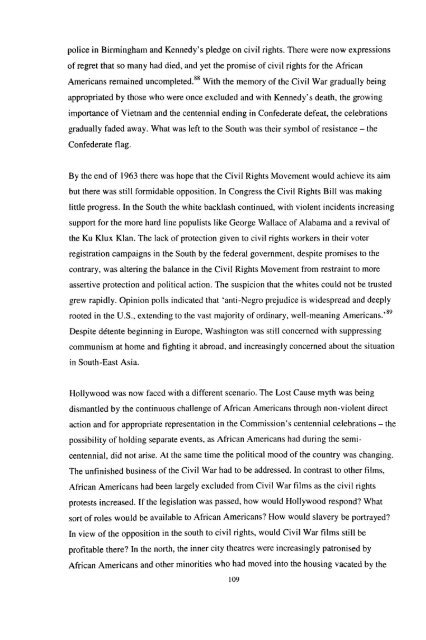Download (3483kB) - Greenwich Academic Literature Archive ...
Download (3483kB) - Greenwich Academic Literature Archive ...
Download (3483kB) - Greenwich Academic Literature Archive ...
- No tags were found...
You also want an ePaper? Increase the reach of your titles
YUMPU automatically turns print PDFs into web optimized ePapers that Google loves.
police in Birmingham and Kennedy's pledge on civil rights. There were now expressionsof regret that so many had died, and yet the promise of civil rights for the AfricanAmericans remained uncompleted. 88 With the memory of the Civil War gradually beingappropriated by those who were once excluded and with Kennedy's death, the growingimportance of Vietnam and the centennial ending in Confederate defeat, the celebrationsgradually faded away. What was left to the South was their symbol of resistance - theConfederate flag.By the end of 1963 there was hope that the Civil Rights Movement would achieve its aimbut there was still formidable opposition. In Congress the Civil Rights Bill was makinglittle progress. In the South the white backlash continued, with violent incidents increasingsupport for the more hard line populists like George Wallace of Alabama and a revival ofthe Ku Klux Klan. The lack of protection given to civil rights workers in their voterregistration campaigns in the South by the federal government, despite promises to thecontrary, was altering the balance in the Civil Rights Movement from restraint to moreassertive protection and political action. The suspicion that the whites could not be trustedgrew rapidly. Opinion polls indicated that 'anti-Negro prejudice is widespread and deeplyrooted in the U.S., extending to the vast majority of ordinary, well-meaning Americans.' 89Despite detente beginning in Europe, Washington was still concerned with suppressingcommunism at home and fighting it abroad, and increasingly concerned about the situationin South-East Asia.Hollywood was now faced with a different scenario. The Lost Cause myth was beingdismantled by the continuous challenge of African Americans through non-violent directaction and for appropriate representation in the Commission's centennial celebrations - thepossibility of holding separate events, as African Americans had during the semi-centennial, did not arise. At the same time the political mood of the country was changing.The unfinished business of the Civil War had to be addressed. In contrast to other films,African Americans had been largely excluded from Civil War films as the civil rightsprotests increased. If the legislation was passed, how would Hollywood respond? Whatsort of roles would be available to African Americans? How would slavery be portrayed?In view of the opposition in the south to civil rights, would Civil War films still beprofitable there? In the north, the inner city theatres were increasingly patronised byAfrican Americans and other minorities who had moved into the housing vacated by the109
















